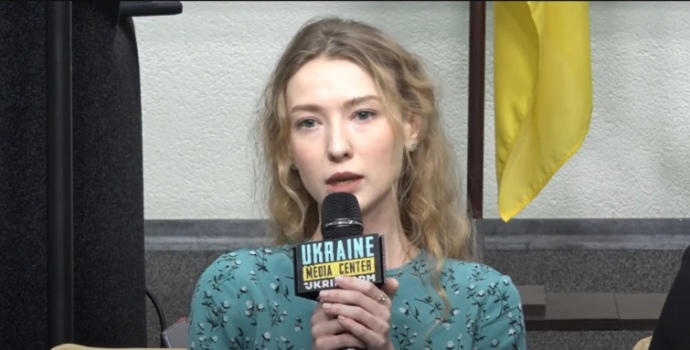“Reeducation camps” and age change: human rights activist recounts how Russians abduct children
Russians change personal details of the children abducted from Ukraine in order to complicate the process of finding them. In particular, there are cases when Russians have added several years to the actual age of children whom they brought to "reeducation camps" in temporarily occupied Crimea. Source: Kateryna Rashevska, expert at the Regional Centre for Human Rights, at a briefing in the Mediacentre Ukraine on 24 February
Quote from Rashevska: "I cannot guarantee that they [Russians - ed.] are doing this all the time. However, we have detected cases when they changed the children's personal information, for instance, while transferring them to the so-called 'reeducation camps' in order not to be obliged to get an approval from parents.
They have practically added years to their age and then taken them to Crimea. A child was kept there without a possibility to go back, as he/she was no longer a child, as per their documents.
Freedom of movement was unlawfully restricted by the Russian Federation."
 Kateryna Rashevska has spoken about Russian "reeducation camps"
Kateryna Rashevska has spoken about Russian "reeducation camps"
Details: There are also very young children who cannot remember their real names because of trauma they suffered. Kateryna Rashevska has spoken about Russian "reeducation camps" that are "camps of Russification, militarisation and indoctrination", so to say. There are seven of such camps on the Crimean peninsula, and 43 more in Russia.
We have launched English Twitter!
Follow us!
"In some of them, there were children, taken without their parents' permission and with forged documents. There were also situations when about 200 children were brought and accommodated in the 'camps'," Rashevska said. Ukraine has already notified the International Criminal Court of the actions of Maria Lvova-Belova, the Presidential Commissioner for Children's Rights in Russia, who "adopted" Filip, a Ukrainian boy from Mariupol.
"During her last meeting with Putin, Maria Lvova-Belova forgot something or intentionally manipulated Filip's age by saying he was 15 years old. At the same time, she said almost a year ago that Filip was 16. And if we compare the information she provided, we will get that he is 17.
Because she said that Filip lost his mother in 2017, when he was 11," Rashevska added. Rashevska has pointed out that such misrepresentation of the information occurs pretty often, and children's personal details are changed not just during the adoption process. According to the human rights activist, registers that were in the temporarily occupied regions of Donetsk and Luhansk oblasts, as well as the information that the occupiers stole from orphanages in newly occupied territories, are synchronised with the federal database about orphans of the Russian Federation.
Kateryna Rashevska has highlighted that Ukraine will need to make enormous efforts in order to identify such children, find families that took them and repatriate the children back to Ukraine. "We have an issue with identification - and it is the first problem that the state needs to resolve," she added. Ukraine has succeeded in identifying 16,000 of the deported children.
In 2022, 400 children were sent to Russian families; this information is available on the Children of War portal. "We need to try and develop a single legal mechanism to get such children back. We cannot wait for a year or two, or till the end of the war, as some children are already reaching the age of 18, and it means that boys can be called up to the Russian army," Rashevska stressed.
In addition, human rights activists have found out that the Russians take children with an excuse of "clinical examination" that means medical intervention by the Russian doctors.
Journalists fight on their own frontline. Support Ukrainska Pravda or become our patron!